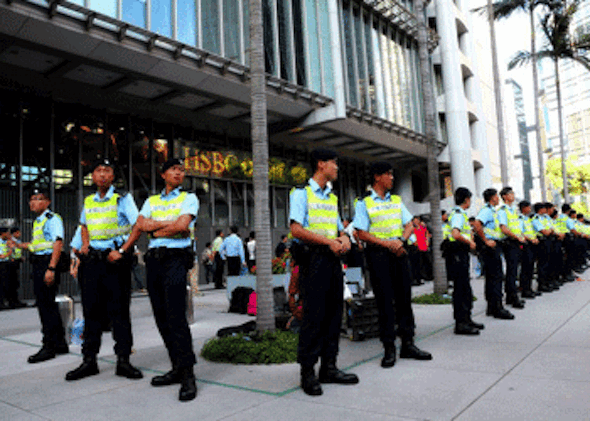Beijing Wants HK Police to Tighten Up
Asia Sentinel
Written by Our Correspondent

National People’s Congress chairman says no more nice guys
Beijing officials are moving to co-opt the Hong Kong police force in the effort to create problems for government critics, particularly those deemed unpatriotic. In the process they may be discouraging the police from going after triads, the organized crime gangs which are used from time to time by the Communist Party to do their dirty work.
A few weeks ago a case where a woman teacher used expletives at police for what she deemed their biased actions when a “patriotic” group endeavored to disrupt a meeting of Falun Gong supporters was blown out of all proportion by the government. Police were encouraged to demonstrate against the teacher and a huge fuss was made out of a very minor incident, including by the Chief Executive C.Y. Leung.
Now the issue has implicitly been ratcheted up further in a meeting in Beijing between the National Peoples’ Congress chairman Zhang Dejiang and Hong Kong’s senior security official Lai Tung-kwok. Zhang heaped praise on the Hong Kong police and their role in safeguarding national security and social order. He went on to link that to the achievements of the government under C.Y.Leung, despite the low level of popularity which Leung faces, which is at least one cause of the number of demonstrations seen in the territory in recent months.
Beijing’s attempt to curry favor with the rank and file of the police is clearly aimed at driving a wedge between them and pro-democracy and other demonstrators so that the latter become an enemy rather than citizens exercising their rights. The meeting between China’s seniormost official dealing with Hong Kong affairs and the local security chief implied that Beijing wanted the authorities to take a hard line against demonstrators and snuff out the “Occupy Central” movement which vows peaceful protest to shut down the centre of the city next year if the full franchise supposedly promised by Hong Kong’s Basic Law is not delivered.
It may also presage the return of efforts by the government to enact legislation dealing with “secession, sedition, subversion against the central government, theft of state secrets” etc This is required under Article 23 the Basic Law but when the government tried to introduce it in 2003 mass protests resulted on account of the sweeping and vague nature of charges widely used on the mainland to silence all forms of dissent.
The then security minister responsible for that debacle, Regina Ip, was sacked. She has since returned to the public eye as a member of the Legislative Council and is proclaiming to be a democrat. However she is widely regarded in democratic circles as one who remains a stalking horse for Beijing. Following the Zhang/Lai meeting she was quick to comment positively on it and to praise the police in words which implied that they were a bastion against public pro-democracy protests.
The issue of Article 23 has also been given new attention by the appearance of a page on Facebook implying that enabling legislation is needed and should be discussed. The identity of the originator of the page remains unknown but has every appearance of being the work of one of Beijing’s many “united front” puppets seeking to make Hong Kong’s system more like that of the mainland, in particular by deeming criticisms of government as unpatriotic, or worse. A harder line on Hong Kong also fits with Beijing’s current war on internet sites criticizing the government or revealing the misdeeds of officials.
Political and social tensions could well increase as the push for reform by a disgruntled Hong Kong middle class runs up against Beijing interests, and as radical local groups with grass roots support take to the streets.
